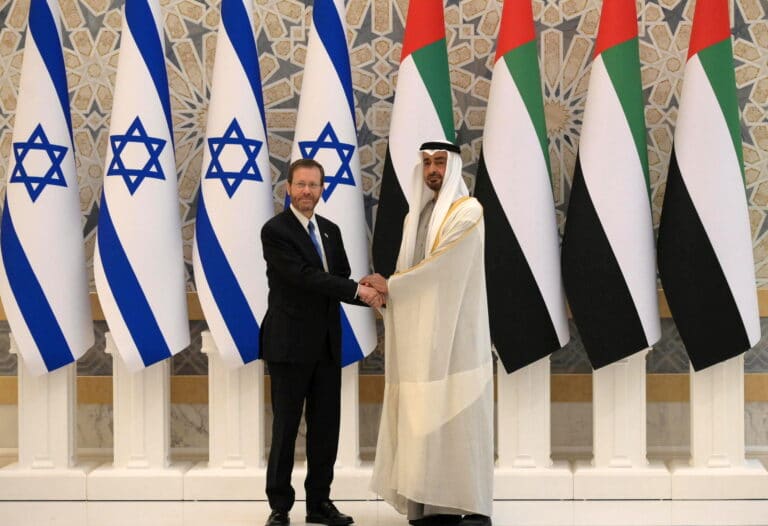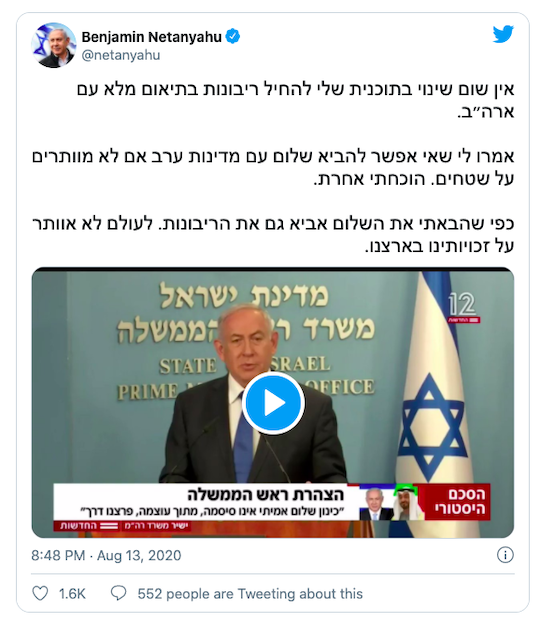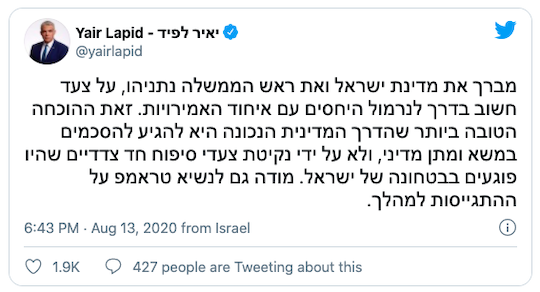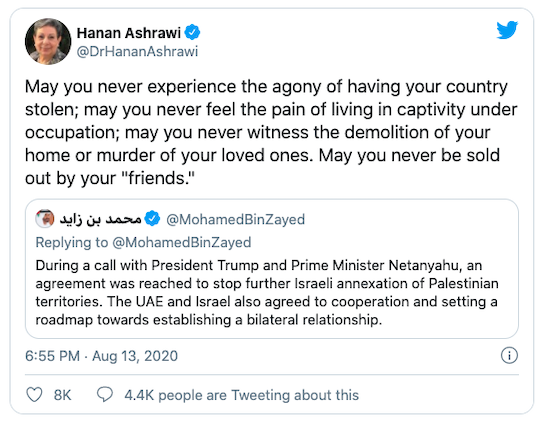
We’re Curious…
Last week, Israel reached a historic agreement with the United Arab Emirates to normalize relations between the two countries in a deal announced by the White House. According to the joint statement from Prime Minister Benjamin Netanyahu, UAE leader Sheikh Mohammed bin Zayed and President Donald Trump, Israel and the UAE will sign bilateral agreements regarding investment, tourism, direct flights, security and the establishment of reciprocal embassies. The joint statement also said that Israel will suspend its plans to annex parts of the West Bank and focus on “expanding ties with other countries in the Arab and Muslim world.”
Israeli politicians from across the political spectrum welcomed the agreement; however, hard-right and settler leaders criticized the deal because of its requirement that Israel suspend its annexation plans. Palestinian leadership also blasted the agreement, with the Palestinian Authority calling it “a betrayal of the Palestinian people.”
If the deal holds, the UAE would become the third Arab country to establish fully normalized relations with Israel. It would join Egypt, which signed a peace agreement with Israel in 1979, and Jordan, which signed a treaty in 1994. How did this historic agreement happen, and why are many Palestinians and Israeli settlers upset about it? And will other Arab countries follow in the UAE’s footsteps?
The Real Deal of the Century?
This historic agreement has a number of big implications and takeaways. First, from a political perspective, this looks like brilliant diplomacy. Michael Koplow, policy director of the Israel Policy Forum, said Netanyahu did a great job “threatening to do something over the top and then benefitting by keeping things exactly as they are.” Similarly, Itamar Rabinovitch, Israel’s former ambassador to the US, observed: “Instead of Israeli annexation for a Palestinian state, they made it Israeli non-annexation in return for peace with the U.A.E.” He added that Jared Kushner “basically generated an asset out of nothing, which Israel could then trade for peace with UAE.” Were Israel’s annexation plans no more than a threat that would be used by all three parties involved in a deal later on? Did things just work out the way they did, or were events over the last six months by design, resulting in a giant game of political chess? And is this President Trump’s first unambiguous diplomatic success?
Second, this agreement is important because it shines a light on the difference between the Palestinian-Israeli conflict and the Arab-Israeli conflict. Since Israel’s founding, most of the wars Israel has fought have been against sovereign Arab nations, not Palestinians. To what extent is Israel mired in a Palestinian-Israeli conflict, and to what extent is this a broader conflict against other non-Palestinian regional players, like Hezbollah, Iran, Russia, ISIS in the Sinai Peninsula, and other Arab states? The journalist Matti Friedman argues that to understand the conflict surrounding Israel, it is more accurate to use the wider lens of “Arab-Israeli” compared to the “Israeli-Palestinian” framing “with all the other regional components obscured.” Should this change the way we approach this conflict?
Third, this agreement breaks with a longstanding approach of Arab nations toward Israel. This general approach has been based on “the idea that the gulf Arabs would normalize with Israel only after the Israelis satisfied the demands of the Palestinian Authority with a state to its liking,” as the New York Times columnist Thomas Friedman wrote. With this precedent broken, to quote Friedman, the deal has “stripped [Palestinian Authority leader Mahmoud Abbas] of his biggest ace in the hole.” The deal raises the possibility that Arab-Israeli peace is not necessarily contingent upon Palestinian-Israeli peace — or the Palestinians having a state of their own. Annexation is a red line for Arab countries, and removing annexation seems to be key to Israel’s ability to normalize ties with some of them. But barring this, for some Arab nations, the Palestinian issue may no longer stand in the way of establishing formal ties with Israel.
This brings us to a fourth point: This deal shows that the Muslim world is not homogeneous. Friedman wrote that by participating in this deal, the UAE sent a powerful message to the Iranians and their proxies: “There are really two coalitions in the region today — those who want to let the future bury the past, and those who want to let the past keep burying the future. The U.A.E. is taking the helm of the first, and it is leaving Iran to be the leader of the second.” Which of the two paths will Muslim and Arab countries now take with respect to Israel?
How the UAE Deal Happened
According to the New York Times, the UAE had been contemplating establishing formal relations with Israel for the past year. During this time, Yossi Cohen, the head of the Mossad, Israel’s intelligence agency, made several secret trips to the Emirates in an effort to enhance cooperation between the two countries. In July, companies from Israel and the UAE signed an agreement to research and develop technology together in the fight against the coronavirus pandemic — a sign of the countries’ warming ties.
The road to the UAE agreement was kickstarted in June when Yousef al-Otaiba, the Emirates’ ambassador to the United States, wrote an op-ed in the Israeli newspaper Yediot Ahronot. Appealing directly to Israelis in Hebrew, al-Otaiba warned “It’s Either Annexation or Normalization,” and that moving forward with annexation would jeopardize progress made in the relationship between Israel and many Arab countries. He wrote: “In the UAE and across much of the Arab world, we would like to believe Israel is an opportunity, not an enemy. We face too many common dangers and see the great potential of warmer ties.”
Jared Kushner, President Trump’s son-in-law and senior advisor, said he recognized an opportunity for peace in the op-ed: “After that, we started a discussion with UAE, saying maybe this is something we can do.” He approached the Emiratis and the Israelis, and negotiations began. This culminated in the joint statement announcing the agreement. Shortly after the announcement, Kushner said: “We hope this is an icebreaker where Israel can now normalize relations with other countries.”
Reactions from Israeli Politicians and Settler Leaders
Announcing the agreement, Prime Minister Netanyahu said that it “ushers in a new era of peace between Israel and the Arab world.” He said the peace deal “shows the dramatic change” in the way Israel is perceived in the Middle East and predicted that other Arab states would follow the UAE’s lead.
Seemingly contradicting the joint statement, Netanyahu said that “there is no change in my plans to apply sovereignty in full coordination with the US” and that the suspension of annexation was only “temporary” at the request of the White House.
Underscoring that the deal traded “peace for peace,” he added: “They said it was impossible to bring about peace if you don’t give up land. I proved otherwise.”

Support for the deal extended to members of the opposition and Israeli left. Leader of the opposition and the Yesh Atid party Yair Lapid said: “I praise the State of Israel and Prime Minister Netanyahu on an important step toward normalizing relations with the United Arab Emirates. This step is proof that negotiations and agreements — not unilateral steps like annexation which would harm Israel’s security — are the way forward for our diplomatic relations.”

Labor party leader Amir Peretz expressed a similar sentiment, saying that the agreement shows diplomacy and negotiations can lead to peace. He argued that applying sovereignty to parts of the West Bank would not have been good for Israel.
Meanwhile, many politicians to the right of Netanyahu criticized the deal. Yamina party leader Naftali Bennett first praised the agreement between Israel and the UAE, but added that Netanyahu had “missed a once-in-a-century opportunity.” He said: “It is tragic that Netanyahu did not…muster the courage to apply sovereignty to even an inch of the Land of Israel.”
The chairman of the Yesha council of settlement mayors, David Elhayani, said Netanyahu had “betrayed” the settler community after promising them repeatedly that he would apply sovereignty to parts of the West Bank. “He led [the nearly] half a million residents of the area and hundreds of thousands of voters astray,” Elhayani concluded. Settler leaders like Samaria Regional Council chairman Yossi Dagan are not buying Netanyahu’s assertion that Israel’s “suspending” annexation of parts of the West Bank is only temporary. “There is a limit to how much one can deceive the public,” he said.
Reactions from Palestinian Leaders and the Arab World
Just as many Israeli settlers felt betrayed by Netanyahu, many Palestinians felt betrayed by UAE leader Mohammed bin Zayed.
Many Palestinians oppose the normalization of relations between Israel and Arab states because it legitimizes what they see as the occupation of the Palestinian people or Palestinian land. While the agreement will halt annexation (either permanently or temporarily), it does not change the status quo.
Commenting on Zayed’s announcement of the deal, PLO executive committee member Dr. Hanan Ashrawi captured this sentiment: “May you never experience the agony of having your country stolen; may you never feel the pain of living in captivity under occupation; may you never witness the demolition of your home or murder of your loved ones. May you never be sold out by your ‘friends.’”

Palestinian Authority spokesperson Nabil Abu Rudeineh said: “The Palestinian leadership rejects the actions of the Emirati government, considering it to be a betrayal of the Palestinian people and Jerusalem and al-Aqsa.” Meanwhile, Ahmad Majdalani, a member of the Palestine Liberation Organization, said: “This agreement is a total departure from the Arab consensus. The Palestinian people have not authorized anyone to make concessions to Israel in exchange for anything.”
Israel’s Arab allies, on the other hand, mostly praised the agreement. Egyptian President Abd al-Fattah el-Sissi said: “I followed with great interest and appreciation the tripartite statement between the United States of America, our brothers [the] United Arab Emirates, and Israel regarding the agreement to stop Israel’s annexation of the Palestinian territories and to take steps to bring peace to the Middle East. I value the effort of those embarking upon this agreement for the sake of achieving prosperity and stability for our region.”
The government of Bahrain said in a statement: “This historic step will contribute to strengthening stability and peace in the region.” And the government of Oman expressed hope the move would “contribute to achieving a comprehensive, just and lasting peace in the Middle East.” Bahrain and Oman have both been identified as nations that could follow the UAE in normalizing their ties with Israel in the near future.
Originally Published Aug 17, 2020 12:12AM EDT


